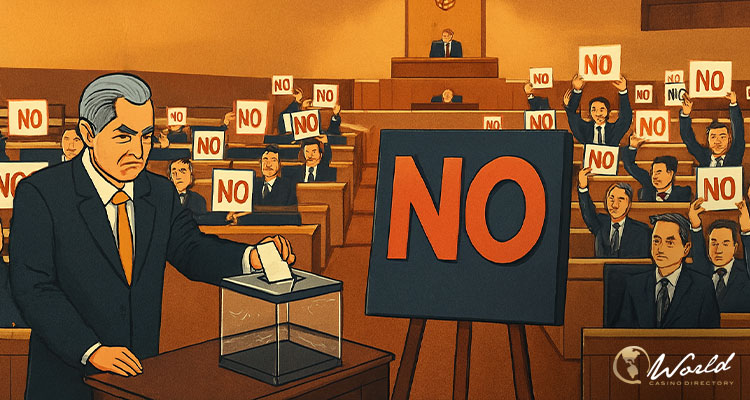Thailand’s Senate has officially voted down acontentious draft law that would have paved the way for integrated entertainment complexes featuring casinos. The legislation, initially put forward under former Prime Minister Paetongtarn Shinawatra’s government, faced mounting resistance over its potential to destabilize Thai society, economy, and national security.
The bill underwent extensive scrutiny by a special committee led by Senator Dr. Veerapun Suvannamai. During the Senate session, chaired by Deputy Senate President Gen. Kriengkrai Srirak, the committee delivered its verdict: casino legalization, at least in the form proposed, carried unacceptable long-term consequences. Lawmakers warned that the initiative could heighten money laundering risks, undermine public trust in governance, and erode social stability.
The committee emphasized that if any future administration revisits the casino question, it must do so transparently and with public participation, according to Bangkok Post. Its recommendation was clear — a national referendum should precede any attempt to legalize casinos.
Alternative Models and International Comparisons
Vice chair of the committee, Senator Sornchat Vichaya Suwannaprom, argued that Thailand should not abandon the idea of entertainment complexes altogether, but instead explore other models. He proposed forming a new study group to consider different frameworks, including complexes without casinos, restricted-entry gambling zones, or even controlled online gambling systems.
Senator Sornchat drew on international precedents, pointing to Sydney, Australia, where casino entry is limited to registered tourists. He suggested that Thailand could adapt a similar model if the government ever reconsiders the policy.
Senators Challenge the Bill’s True Intent
While the bill was packaged as a broad entertainment initiative, some senators criticized it for obscuring its central purpose. Senator Chinachot Saengsang delivered one of the sharpest critiques, declaring, “The casino is not a side feature — it’s the core of the proposal.” He warned that if future governments tried to include casino legalization in their policy platforms under the guise of entertainment development, it would severely damage public confidence in governance.
Other lawmakers echoed this skepticism. Senator Sitthikorn Thongyos noted that recent policy moves — including the reclassification of poker and the launch of retirement lotteries — had already contributed to normalizing gambling in Thai society. He warned that this gradual shift could set the stage for full-scale legalization and urged the new administration to abandon the proposal altogether.
Political and Economic Context
The Senate’s rejection aligns with the stance of Prime Minister Anutin Charnvirakul, who has consistently opposed casino legalization since assuming office. Anutin has underscored that Thailand’s tourism development should steer clear of policies that could weaken social harmony or compromise national security. This marked a clear departure from the approach taken by the previous Paetongtarn administration, which had strongly advocated for the bill as a potential driver of economic recovery.
The proposal originally gained traction amid concerns over Thailand’s sluggish post-pandemic economy. Supporters believed that casino-based entertainment complexes could attract higher tourist spending and potentially add about one percent to the country’s GDP. A 2024 report by Maybank Securities projected that such complexes might generate as much as THB187 billion (USD 5.14 billion) annually, drawing on pre-pandemic tourism data.
In addition, Thailand’s suggested 17 percent casino tax rate was touted as more competitive compared to neighboring countries. Jurisdictions such as Singapore, Malaysia, the Philippines, and Macau typically impose tax rates ranging from 25 to 40 percent, making Thailand an attractive alternative in the regional gaming landscape.
Yet, despite these economic arguments, the Senate committee warned that the supposed financial benefits were overstated. The report concluded that the revenue would largely amount to wealth transfer from losers to winners rather than genuine economic growth. At the same time, infrastructure expenses and regulatory demands would weigh heavily on the state.
Looming Political Transition
Another factor shaping the Senate’s rejection is Thailand’s shifting political landscape. Parliament is expected to dissolve within four months, following a memorandum of agreement between the Bhumjaithai Party-led coalition and the main opposition party. As Dr. Veerapun explained, any party with ambitions to revisit casino legalization should be transparent with voters and declare it openly during campaign season rather than embedding it within broader entertainment policies.
This political reality, coupled with Paetongtarn Shinawatra’s departure from power, further diminished the bill’s prospects. For a time, it had seemed that Thailand might join the ranks of regional casino hubs such as Singapore, South Korea, Vietnam, the Philippines, and Macau. However, once Paetongtarn’s government left office, enthusiasm waned, and opposition gained the upper hand.
Warning of Long-Term Consequences
The Veerapun committee’s final report strongly advised against moving forward with the casino-entertainment complex concept. It cautioned that adopting the bill in its current form could result in serious constitutional, economic, and social repercussions.
The rejection underscores the Senate’s broader concern that short-term financial gains cannot outweigh the potential damage to national security, public trust, and social order. In the words of Senator Chinachot Saengsang, “If the new government includes casino legalisation in its policy platform, it risks undermining public confidence and long-term governance.”
Ultimately, the Senate’s decision reflects a broader consensus that Thailand’s tourism and economic growth must be pursued through safer, less divisive strategies. While alternative models such as limited-access zones or online platforms may remain topics for discussion, the immediate prospect of legal casinos in Thailand has been firmly set aside.



